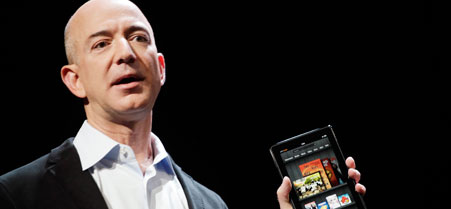Justice lawsuit could allow Amazon to dictate e-book prices industrywide
The government's antitrust suit against Apple and five publishers will make Amazon more powerful than ever in publishing.
 Mark Lennihan/AP
Mark Lennihan/AP
For the next two years, Amazon CEO Jeff Bezos will be free to dictate the price of eBooks across much of the publishing industry.
That, more or less, is what we can take away from the antitrust suit the Department of Justice filed yesterday against Apple and five major publishing houses, which alleges that they colluded in 2009 to raise the price eBooks and stop Amazon from using steep discounts to lure customers . Already, three publishers have settled on terms so friendly to Amazon that, as Wired's Tim Carmody put it, Bezos should send the attorney general an early Christmas card. Two more are still fighting the case, along with Apple. But there's little doubt about what the outcome will be for the book world.
Readers will pay less. That's the bright side. The settlement gives Amazon carte blanche to discount the eVersions of popular titles, much as it used to. Of course, that also happens to be the dark side. Because that control over price is going to reinforce the monopoly power of the world's largest online retailer.
In the government's telling, their suit is about aging industry incumbents ganging up to undermine an innovative retailer whose consumer-friendly business model threatened their bottom lines. After effectively launching the eBook market with the release of the Kindle, Amazon began marketing new releases and best sellers for $9.99 -- essentially at cost -- in order to attract customers to their device. According to the Department of Justice, this terrified much of the old New York publishing establishment, which believed it would cause the price of books to drop permanently once buyers became accustomed to the discounts. In response, they banded together and used a new agreement with Apple as leverage to force Amazon into accepting so-called "agency model" contracts, which empowered the publishers to set the price of books themselves.
Read the full story at The Atlantic





